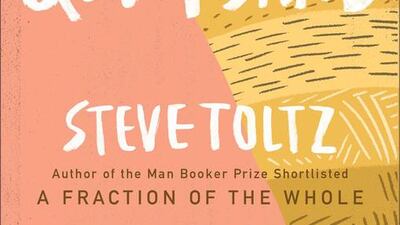Steve Toltz is a male comic novelist who, like most male comic novelists, is interested in the nature of male crises. In his debut novel, A Fraction of the Whole (which was shortlisted for the Man Booker Prize in 2008 and won the Guardian First Book Award), he offered a sprawling, associative and digressive account of a family in turmoil: of Terry and Martin Dean (brothers); and of Martin's son, Jasper, who tells us from prison near the beginning of the book: "My father punished me for existing, and now it's my turn to punish him for existing. It's only fair."
The tone of those phrases – wounded, vengeful, lightly satiric – captures something of the tenor of Toltz's latest novel, Quicksand, which shares its predecessor's preoccupation with male existential distress – in this instance, with the despair that can be engendered by the most intimate and testing of male friendships.
“The weird truth is I’ve often become good friends with people I originally disliked,” says Liam Wilder, the narrator of most of the novel, “and the more I downright loathed the person, the better friends we eventually became.” Liam is speaking here of Aldo Benjamin, a figure whom, he goes on to remark, “irritated me at first, then infuriated me, then made me sick, then bored me senseless, which led to his most unforgivable crime”,
Liam is a failing writer who has trained as a police officer to support his family and strengthen his loosening grip on his marriage (“the more she slipped away, the more I loved her”). What he says of Aldo is true – to a point. But he also needs his friend, for it is Aldo, he finally realises, in whom he has found his natural subject as a writer: “Nobody lives like him and lives to tell the tale. I’d tell his tale! I’d curate an exhibition of his foibles and follies. I felt luminous, intrepid, like a correspondent embedded in hell.”
The material Liam has to work with in the form of his new subject is admittedly pretty appealing: Aldo is a lovely comic creation. A man of “substandard luck and submental ideas”, he is a victim of “pathological entrepreneurialism” for whom no untapped market (“Couples with mismatched libidos! Honeymooners with creeping malaise! Insomniacs with global dread!”) is beyond consideration. On the contrary, “he always felt tremendous optimism for a project and then incredulity when it bombed”.
Toltz chronicles Liam and Aldo’s friendship by jumping backwards and forwards in time. The novel opens with the pair in their 40s, at which point Liam has already decided to make Aldo the subject of his writing, and Aldo has a failed marriage, a prison term, and two working legs behind him. We then see how the nature of their relationship has evolved over the course of its history, and how it develops in the present-day of the book itself.
It is an effective and well-tried technique, and Toltz handles his subject with appealing energy and exuberance. He has great feeling for the intimacies and frustrations of the closest of friendships, and can write movingly and amusingly about the ways in which his characters’ fixations on “unachievable goals (Aldo’s businesses, my writing) had somehow made us bystanders in our own love lives”.
Yet for all the entertainment on offer, the novel is plagued by a persistent sense of weightlessness, and by a feeling that Liam is not always speaking with his own voice, is being asked to function as a conduit for Toltz himself. It is not that Toltz uses such opportunities to slip his “own” views into the text; it is more that he has his characters speak in ways that seem at odds with their established registers. Accordingly, when Liam is on the beach he observes a woman “seemingly riddled with breasts” (I do not know what this means); and when he finds himself on a surfing expedition, riding a wave into shore makes him feel “like a child riding a paedophile’s back”.
Lines such as these do not conform sufficiently to character to make them satiric; and they are not funny or acute enough to make them forgivable as instances of authorial intrusion. They are, however, plentiful. Which is a pity. For it is in their pervasion of this otherwise carefully and lovingly written work that they prevent Quicksand from amounting to the seriously funny novel about male crises it had the promise to be.
This book is available on Amazon.
Matthew Adams is a London-based reviewer who also writes for the TLS, the Spectator and the Literary Review.
thereview@thenational.ae

